Hey guys! Amanda here. You probably know me through American Fille as the traveling au pair cat lady. But what you may not know about me is that I used to be a Bikini Competitor.
I successfully competed in 2 bikini competitions in 2014, and I unsuccessfully attempted to prep for 4 subsequent shows before I retired.
Oh, and I developed Binge Eating Disorder as a result of being a bikini competitor.
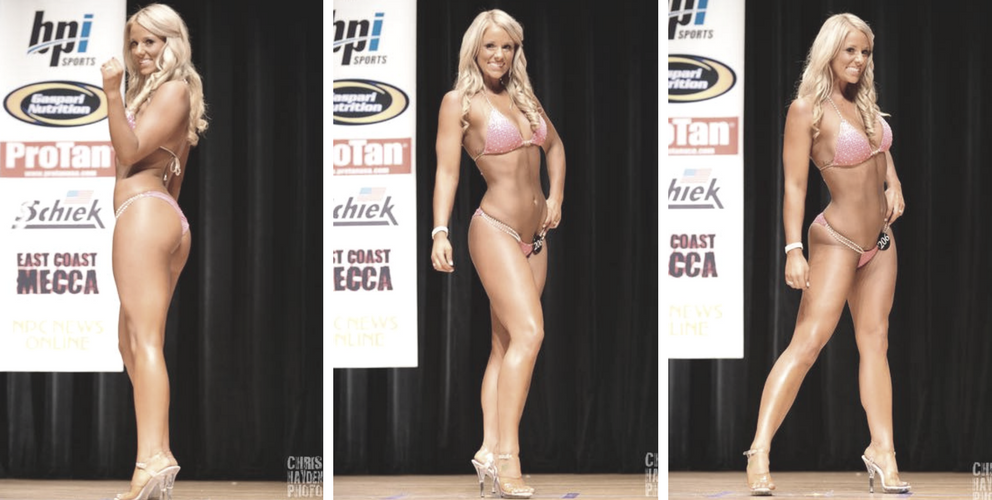
BINGE EATING DISORDER
I was diagnosed with BED in 2015. This is not something I like to share because frankly, it’s embarrassing.
I went from having the best body I’ve ever had in my life to immediately gaining 30lbs in one month. I spent 6 months documenting my progress on social media and reveling in the false sense of importance, to feeling so disgusting that I didn’t want to be seen in public. It was a living hell.
Prior to competing, I had never had an issue with food. Of course I would overeat from time to time, on holidays or on days where I just felt like it, but this is normal. And yes I had done my share of diets in an attempt to cleanse, which is also normal.
But this was different. Prepping for a bikini competition altered my relationship with food in ways I didn’t know were possible. My binging started out slowly, with episodes far and few between, and eventually progressed to such levels of extremity and frequency that I had to seek medical help.
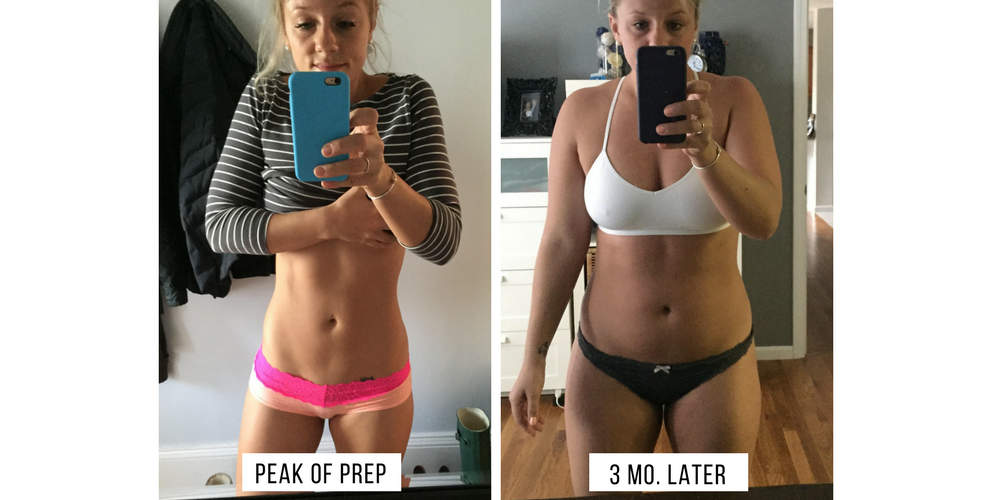
Through my own research and determination, and the help of my doctor, I was able to heal and have reestablished a healthy relationship with food. It didn’t happen overnight, but I am happy with the progress I have made.
But here’s the thing: My story is not unique.
It’s not even rare.
If it were, I would probably accept it as a tough thing I went through and keep it in the past, just like all the other tough things I’ve gone through. But because my story is not uncommon I decided to write this post.
Perhaps one day I will write a more detailed post about my personal experience with Binge Eating Disorder but for today, I want to talk about the link between BED and Bodybuilding.
POST COMPETITION BINGE
Talk to anyone who has competed and I guarantee she’s either experienced a binge-like episode after competing herself, or she knows someone who did.
I am willing to bet my life on it.
It’s one of the best kept secrets in the bodybuilding industry among competitors. When a bikini girl all of a sudden goes quiet on social media, or her posts start to be from the neck up, we know what happened. She binged and gained a ton of weight after her show. “Oh, she’s only posting #TBT pics? Must’ve binged real hard this time. I wonder how long it will take her to lose it. She said she was competing in the spring so I guess we’ll see!” Conversations like that happen constantly.
For something so prominent in a such a huge and very public industry, why is no one talking about this?
There’s a remarkable absence of data linking eating disorders and competitions. When you run a quick google search of “binge eating disorder and bikini competition” or “eating disorder bodybuilding” you will find dozens and dozens of blog posts just like this one: individuals sharing their experiences. Look at some of these titles:
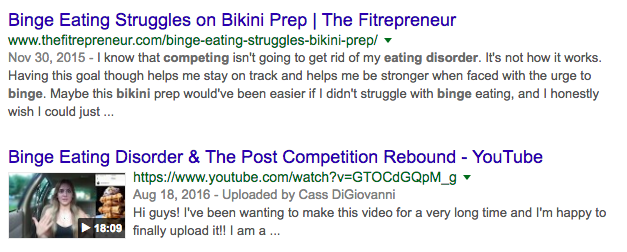

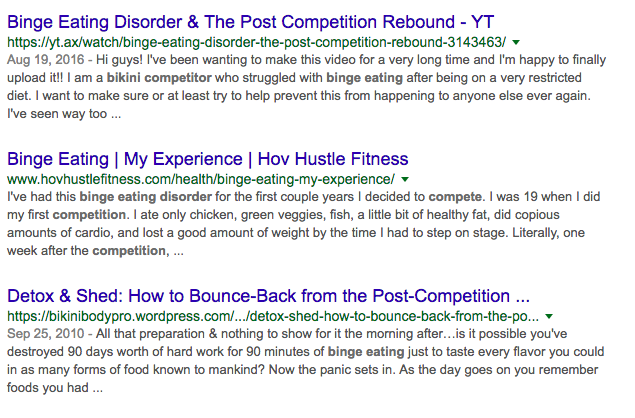
There’s hundreds of them, and those are only the competitors who have a blog or a youtube channel – so the minority. I’d wager there’s 10x as many who’ve shared a similar story on Instagram which is more difficult to search, and thousands who haven’t shared their story publicly. So it’s clearly not a secret within the community.
But as for actual scientific data to back this phenomenon? There’s nothing.
Something that has been going on for years and has affected HUNDREDS of young men and women around the world, which has the potential to cause irrevocable psychological and physical damage, is going completely under the radar. And I’m not okay with it.
Why Do Competitors Binge?
Through my research I’ve found several psychological links between binge eating and competition prep that I would like to highlight. I am not a scientist or a doctor, so these are purely my educated theories.
In my examples below I will try to help you understand what happens to your brain when you develop binge eating disorder, and I will explain which psychological factors reinforce these behaviors.
1. RESTRICTION
Absolute Restriction is a very ineffective way to stop a behavior. It can work in some circumstances through sheer will power, but often the behavior you are trying to stop is more mental than physical, meaning you have to change your mentality around that behavior in order to effectively change, not just avoid the activity all together. This is especially true with food since avoiding certain foods forever is pretty much impossible.
There are a few psychological factors that come into play with restriction:
Heightened attention
When you don’t get what you want, you want it even more. We know this is true. It’s the reason reverse psychology works. It’s the reason we chase after jerk guys because they’re “hard to get”. It’s the reason why Lily Pulitzer only releases each of her prints only once. That which is scarce and unavailable is perceived to be highly valuable.
When something is off-limits or forbidden, you immediately pay more attention to it. And when on a restricted diet, it is common to focus more on the foods you can’t eat. This heightened attention, which can escalate into obsession, makes the off-limit food seem very important. (source)
Psychological Reactance
Reactance is a motivational reaction to offers, persons, rules, or regulations that threaten or eliminate specific behavioral freedoms. Reactance occurs when a person feels that someone or something is taking away their choices or limiting the range of alternatives. (source)
This means that as soon as someone tells you you can’t eat something, your inner rebel wants to eat it just on the principal of maintaining your independence.
This is also akin to “Wet Paint Syndrome” where grown adults will touch a freshly painted wall simply because they were warned not to.
EXAMPLE 1
Let’s examine the drinking habits of young Americans vs Europeans. The drinking age in America is 21, meaning alcohol is Absolutely Restricted for anyone under the age of 21 and is culturally viewed as this forbidden, amazing substance that is off limits until you’re old enough for your own very exciting rite of passage that is alcohol.
In Europe, drinking alcohol is culturally perceived much differently. It is integrated seamlessly with meals and is viewed as something you enjoy in moderation, never in excess. European children don’t put drinking alcohol on some glorious pedestal because they’ve been exposed to alcohol from a young age.
What effect does the American approach to alcohol have? It makes the prospect of intoxication extremely elusive and in turn, coveted, for underage young adults.
Although drinking by persons under the age of 21 is illegal, people aged 12 to 20 years drink 11% of all alcohol consumed in the United States. More than 90% of this alcohol is consumed in the form of binge drinks. (source)
Recent research published by the World Health Organization found that in many European countries where the drinking age is 18 or younger, 15 and 16 year-old teens have more drinking occasions per month, but fewer occasions of dangerous intoxication than their American counterparts.
EXAMPLE 2
Now I’d like to examine a second example involving alcohol addiction. I’m sure you’re probably thinking “But Amanda, alcohol isn’t food, how is this relevant?” And I’m glad you asked. You see, although the effect alcohol has on the body is very different, the chemical reaction in the brain that leads to addiction in alcohol is the exact same chemical reaction the leads to addiction in food.
The research for this example was conducted by American neuroscientist John David Sinclair while researching the effects of alcohol on the brain in Finland.
“Sinclair has researched alcohol’s effects on the brain since his days as an undergraduate at the University of Cincinnati, where he experimented with rats that had been given alcohol for an extended period. Sinclair expected that after several weeks without booze, the rats would lose their desire for it. Instead, when he gave them alcohol again, they went on week-long benders, drinking far more than they ever had before—more, he says, than any rat had ever been shown to drink.
Sinclair called this the alcohol-deprivation effect, and his laboratory results, which have since been confirmed by many other studies, suggested a fundamental flaw in abstinence-based treatment: going cold turkey only intensifies cravings.
Sinclair came to believe that people develop drinking problems through a chemical process: each time they drink, the endorphins released in the brain strengthen certain synapses. The stronger these synapses grow, the more likely the person is to think about, and eventually crave, alcohol—until almost anything can trigger a thirst for booze, and drinking becomes compulsive.” (source)
In the brain of a binge eater, food functions as a drug. You crave it like a drug and your body releases endorphins as if it were a drug, which is why so many binge eaters describe the “high” they experience when they binge.
What does this mean? It means restriction perpetuates binge behaviors.
2. CHEAT MEALS
Oh, the cheat meal. You dangerous son-of-a-bitch.
In theory, cheat meals seem like a great idea. Here’s how a cheat meal is supposed to work: You work hard all week, killing it in the gym and following your meal plan to a T, and then for one meal on the weekend you get to reward yourself with a cheat meal. A balanced meal that isn’t a part of your standard meal plan.
Sounds harmless, right?
But you’re forgetting something. In order to have a cheat meal, it means you spent all week restricting. And what did we just learn about restriction?
Here’s how a cheat meal actually plays out:
You spend all week thinking about your cheat meal, planning what forbidden food you’re going to indulge in. The first few weeks of your prep, your cheat meal will likely fall on a Friday or Saturday night. Your cheat meal will probably involve going out to dinner, having a few drinks, an appetizer, an entree, and a dessert. You may eat beyond your comfort level but that’s okay! You only get one cheat a week and you can’t waste it!
As time goes on, you start to think about the foods you’re not supposed to be eating, giving them more attention than normal, and you may even have your cheat meals planned out well in advanced. Your cheat meals start to become more indulgent, including food you would never eat normally and in quantities well beyond your average eating habits.
Because you only get one cheat meal a week, you may find yourself bingeing, where the goal of the meal shifts from enjoying a nice treat to prolonging the “high” feeling you get from ingesting high quantities of fats and sugars in short period of time.
This is obviously not great on the body, so the day after your cheat meal you start to find yourself bloated, groggy, and uncomfortable. You may feel like you need to undo the cheating from the day before, so you might skip your morning oats or stay on the stairmaster just a little longer than coach prescribed. You may even purge or abuse laxtives to undo the damage.
This is how Binge Eating Disorder started for me, and it’s how it starts for many competitors.
When exercised properly, the cheat meal can be a well-deserved mental and physical break for a bikini competitor. But hundreds of coaches (mostly ones who subscribe to IIFYM) are adamantly against cheat meals for this exact reason. It encourages binging behaviors and can be a very dangerous tool.
Where do we go from here?
I wish I had an answer, but I don’t.
Having the conversation and starting to discuss Bodybuilding’s Dirty Little Secret is a great place to start.
How many of you know a competitor who’s experienced this? How many of you have experienced this yourself? How do we get someone to start paying attention? Where are the warnings for prospective competitors?
Those are the questions I’m asking.
—
PS. I am in no way, shape, or form suggesting that you can research your way out of an eating disorder. If you think you might be suffering from BED, please seek medical attention. My research helped me to understand my situation and work towards a solution, but I did so in conjunction with a psychiatrist.
PPS. Here are some of the links that helped me manage my BED. Perhaps they will be helpful to you as well.
- http://www.lifeextension.com/Magazine/2010/8/Curb-Compulsive-Eating-Naturally/Page-02
- http://www.runsforcookies.com/2013/03/how-ive-stayed-binge-free-for-six.html
- https://www.psychforums.com/binge-eating/topic18164.html
- https://www.psychologytoday.com/blog/the-breakthrough-depression-solution/201404/biology-the-binge-food-mood-and-serotonin
- https://www.builtlean.com/2013/05/27/binge-eating/

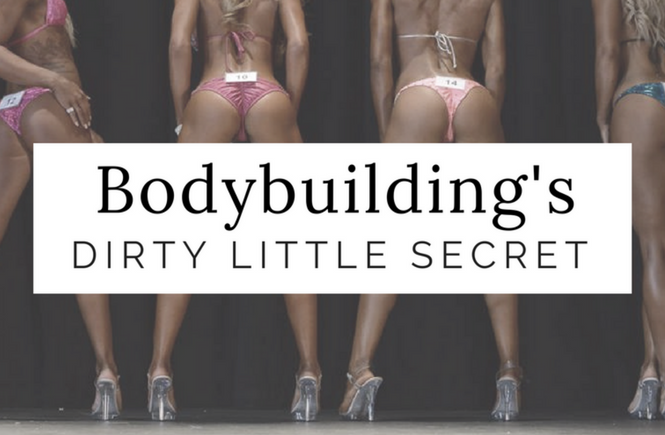
4 Comments
Hi Amanda,
I saw you tweeting about music and I thought I’d check out your website. I really like it. Looks like Amanda has come a long way!
Building a mailing list like you are is so important too, I think people would really like to be signed up to what you have to share.
Good job on the social buttons, social media is so powerful these days
Good job with the Yoast plugin SEO is so important these days.
Also places like supa growth make free software for websites like yours, be worth checking out.
http://linkshrink.net/7dgYuH
Keep making great stuff!
Hey, thank you for checking it out! And thank’s for the positive feedback. 🙂 I actually haven’t figured out HOW to set up my email list yet but I have people subscribed lol. That’s on my list of things I need to do asap….
you have come so far and you should love yourself for you.you are very succesful and you are beautiful.always keep believing in yourself 🙂
Aw thanks Sabrina, you’re the sweetest <3